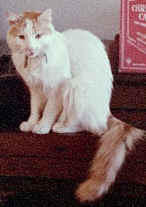If he’s “man’s best friend,” shouldn’t we be his best friend?
Before Hurricane Katrina struck, many people who should have evacuated didn’t. In many cases, it was because those people didn’t have the means to evacuate; they didn’t have cars or the money to buy plane or bus tickets, and the disaster planners didn’t provide transportation. But some people who could have evacuated chose not to. A major reason many people chose not to evacuate was that they couldn’t take their pets with them.
A student of mine, whose entire family comes from the Gulfport/Biloxi area, lost an in-law whom she also regarded as a close friend. The woman wanted to evacuate, but if she evacuated, she would have had to leave her cats behind. There was no provision for pets in the evacuation shelter. She chose to stay with her cats, and she died.
Yes, I know that animals aren’t as important as humans, and that any disaster plan should emphasize saving human lives. But animals aren’t so unimportant as, say, furniture. A sofa can be left behind, with little remorse. A cat or dog is a member of the family, an individual, irreplaceable.
Also, we must take into account the faithfulness of our animal companions. I know many dogs, and also a few cats, who are so dedicated to their humans that they would give their lives to protect those humans. Don’t we owe those animals the same devotion?
I think about what I would do, if I were in the path of a hurricane, and I had a choice of evacuating safely while leaving Dulce and Tres behind, or staying with the cats and taking my chances with the storm. If I evacuated, and then the cats died, I probably couldn’t live with myself.
Here in New Mexico, we’ve been lucky. In the first place, we don’t have a lot of natural disasters. The biggest threat is wildfires, and when a big one erupts, there’s a lot of refuge, not just for humans but also for animals. During the Cerro Grande Fire a few years back, there were shelters for human evacuees, and there were shelters for livestock, provided by the Rio Arriba County, Santa Fe County, and New Mexico State fairgrounds, and for pets, dozens of shelters provided space. Why wasn’t such shelter provided for animals during Hurricane Katrina?
Our animal companions aren’t just lifestyle accessories. We must give them the same devotion that they give us.




